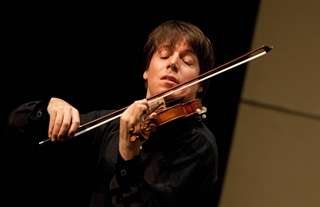|
Back
Bell, Book and Baton New York
David Geffen Hall, Lincoln Center
03/21/2016 - & March 5 (Davis), 7 (Costa Mesa), 8 (Santa Barbara), 9 (Northridge), 11 (Akron), 12 (Chicago), 19 (Newark), 20 (Boston), 2016
Sergei Prokofiev: Symphony No. 1 in D major (“Classical”), opus 25
Pyotr Ilyich Tchaikovsky: Violin Concerto in D major, opus 35
Ludwig van Beethoven: Symphony No. 8 in F major, opus 93
Academy of St. Martin in the Fields, Joshua Bell (leader)

J. Bell (© Eric Kabik)
“As this symphony is one of Beethoven’s most mature masterpieces...I have therefore a very limited number of suggestions to make.”
Felix Weingartner, On the Performance of Beethoven’s Symphonies
Joshua Bell is striving to be all things to all people. Not content to remain a superb violinist with a healthy interest in both vibrato and portamento and a fine sense of violinistic tradition and history, Mr. Bell has embarked on a conducting career that has been reasonably successful over the past dozen years.
A last minute change in programming gave us the “Classical” Symphony as a curtain-raiser. A spirited rendition with Bell in the concertmaster’s chair, this performance was notable for its crispness and interesting dynamic contrasts, including somewhat exaggerated pauses between staccato and legato sections. The final allegro was very fast but also very clean. So far so good.
Next season the conductorless chamber orchestra Orpheus has scheduled a performance of the Tchaikovsky Violin Concerto at Carnegie Hall, which begs the question as to the contribution of a leader situated on the podium. Unlike the last three symphonies of the Russian master, there are no really tricky parts in this piece, no sudden changes of meter, no complex series of sectional entrances, no 5/4 movement (the Sixth Symphony has one of these and many experienced maestros still don’t communicate its flow correctly). Bell has chosen his playlist well and will hopefully move into more treacherous repertoire at the proper time.
It was a time-saver to introduce Bell as both soloist and conductor, but any temporal efficiency was shattered when the crowd did not simply applaud after the first movement, but gave their hero an elongated standing ovation! I have heard Mr. Bell perform this warhorse much more assertively; one wonders if he felt constrained having to wave his bow around at his troops just a few times. The program booklet states that this superhero soloist also wrote original cadenzas for this concerto (did he also drive the bus from the airport?) but these elongated solo passages sounded eerily like the original originals.
The crowd was quite different from Joshua Bell evenings of the past. This was not a gathering of young girls adoring their amanuensis with flowers and sighs, but rather an older crowd of the Broadway variety. The final Beethoven was a standard small orchestra, modern version with crisp contrasts between high and low passages. Only the concertmaster flapping his big bow around somewhat haphazardly gave this version any individuality. The St. Martin orchestra was fine throughout and saved this evening from mediocrity.
So what is the future for Joshua Bell as a conductor? If he truly wishes to become a real maestro, then he must challenge himself to lead a more complex musical canvas, a Bruckner symphony or something from the 20th century (no not “Maria”). Otherwise he is in danger of becoming André Rieu. For now his contribution to the evening was patently obvious: the house was jam-packed and the scalpers outside of David Geffen were doing a land-office business.
Fred Kirshnit
|